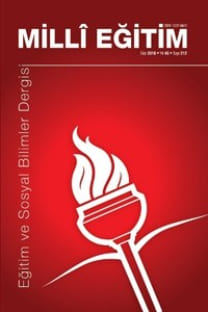E-DEVLET VE ETKİLİLİK: MİLLİ EĞİTİM BAKANLIĞI TAŞINIR MAL YÖNETMELİĞİ MODÜLÜ ÖRNEĞİ
Bilgi toplumunun dünyayı etkisi altına alması ile birlikte gündemegelen e-devlet çalışmalarının hızlı, kolay, tasarruflu, şeffaf, katılımcı, zamandanve mekandan bağımsız, kaliteli hizmetler sunarak, kamu yönetiminde bir çoksorunu çözüme kavuşturacağı sık sık dile getirilmektedir Hitap ettiği kesime ( vatandaş, devlet, iş yaşamı) daha kolay, daha hızlı, daha şeffaf, daha tasarruflu ve daha kaliteli hizmet sunma amacıyla uygulamaya alınan e-devlet uygulamalarının planlanan amaçları gerçekleştirip gerçekleştiremediğinin tespit edilmesi hayati öneme sahiptir. Bu çalışmada; 2007 yılında uygulamaya giren Taşınır Mal Yönetmeliğinin Milli Eğitim Bakanlığı edevlet projesi MEBBİS içerisinde uygulama aracı Taşınır Mal Yönetmeliği Modülü’nü etkililik ölçütü ile değerlendirmek amaçlanmıştır. Bu amaçla oluş- turulan araştırma alt problemlerini çözümlemek için anket formu geliştirilmiş ve bu anket formu örneklem gurubunda uygulanmıştır. Araştırma sonucunda katılımcıların TMY Modülünün etkililiği ile ilgili kararsız görüş belirttikleri görülmüştür. TMY’nin uygulanması ile ilgili birlikte çalışabilirliğin sağlanamadığı, yinelenen projelerlerle e-devlet’in amaçlarına aykırı kaynak israfına neden olunduğu tespit edilmiştir.
Anahtar Kelimeler:
: Elektronik devlet, Etkililik, Taşınır mal.
E-GOVERNMENT AND EFFECTIVENSS: THE MINISTRY OF NATIONAL EDUCATION CHATTEL MODULE REGULATION CASE
With information society’s influence on the world the concept ‘ e – government ’ came to the agenda and it has frequently emphesized that with its fast, easy, efficient, transparent, participatory, time and location independent, high quality service implementations in the public administration many problems would resolve. It is crucial to determine whether e-government applications which were implemented in order to serve easier, faster, more transparent, more efficient and beter qualified objectives to the segments (citizens, government, business life) or not. In this study, it is aimed to evaluate Chattel Regulation of the Ministry of Education, implemented in fall 2007, and e-government projects within the implementation tool MEBBİS Chattel with the measure of the effectiveness of the module. To analyze research sub-problems which were created for this purpose a survey questionnaire was developed and applied in the sample group. It is seen at the end of the research that participants expressed their thoughts as ‘Neither agree nor disagree’ about the effectiveness of TMY module. With the implementation of TMY it is ascertained that colloboration between different government applications can not be provided and with duplicate projects e- government causes waste of resources contrary to its purposes
Keywords:
Electronic government, Effectiveness, Chattel,
- ISSN: 1302-5600
- Yayın Aralığı: Yılda 4 Sayı
- Başlangıç: 1973
- Yayıncı: Milli Eğitim Bakanlığı
Sayıdaki Diğer Makaleler
E-DEVLET VE ETKİLİLİK: MİLLİ EĞİTİM BAKANLIĞI TAŞINIR MAL YÖNETMELİĞİ MODÜLÜ ÖRNEĞİ
Ali İhsan ÇUHADAR, Nihat ERDOĞAN
İBN-İ HALDUN’DAN GÜNÜMÜZE ÖRGÜTLERİN ÇÖKÜŞÜNE DAİR DETERMİNİSTİK BİR YAKLAŞIM
Zülfü DEMİRTAŞ, Mehmet Emin USTA
HARİTA VE PUSULANIN FARKLI BİR KULLANIM ALANI: ORYANTİRİNG
Hayrettin ERGÜN, Zeynep GÜREL, Mehmet Ali ÇORLU
UNESCO’NUN MEDYA OKURYAZARLIĞI EĞİTİMİ FAALİYETLERİNE TOPLU BİR BAKIŞ
Turan TEMUR, Cihan Caner AKSOY, Hasan TABAK
Hayrettin ERGÜN, Zeynep GÜREL, Mehmet Ali ÇORLU
İLKÖĞRETİM 8. SINIF TÜRKÇE DERSİNDE OKUDUĞUNU ANLAMA STRATEJİLERİNİ KULLANMANIN, TUTUMA ETKİLERİ
